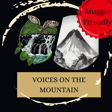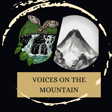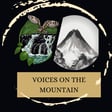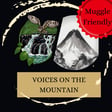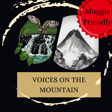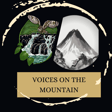Become a Creator today!Start creating today - Share your story with the world!
Start for free
00:00:00
00:00:01

Stress Part II
Is stress always good or bad?!? According to TCM, what kinds of stress should be on our radar and what is the way to navigate these stresses for optimal health? The TCM answers to these questions might surprise you!
Tune in, practitioners and muggles alike, for a deep dive into this key element of a healthy lifestyle!
Transcript
Impact of Cold on Organs in Chinese Medicine
00:00:06
Speaker
The last one that we want to talk about too is the physiological stress. Or psychological stress. Yeah, psychological stress. Oh, one last thing to tie in with the thermal stress though. We'll go through that whole quote at the beginning too, but an interesting thing about thermal stuff is it really correlates to two organs.
00:00:27
Speaker
When we're dealing with cold, for example, we're really looking at lungs on the outside, kidneys on the inside. And so when we're thinking about, well, what does cold arguably do for our body? From a Chinese medicine perspective, that's kind of what we're looking for. So cold on the outside of the lungs, that's a little bit tricky. We don't want to overdo that, but we don't want to underdo that either.
00:00:47
Speaker
So this gets to a really interesting point. Just like Asher said, all the practitioners that you probably know who do Chinese medicine, the students who are in the schools, they fear wind, they fear cold. They probably fear every natural element because they're told to fear all of these things and they probably love porridge. So they're eating rice porridge in a windless, thoroughly controlled room all day long. That is their ideal state of being.
Understanding the Five Qi and the Role of Fire
00:01:13
Speaker
Obviously, this is ridiculous on so many levels, but it's because they've learned that what we call the six different imbalancing forces, or what maybe is a really good translation, the six different excesses, that's often translated as like the six evils. Shout out to Machocha being totally goofy on that thing.
00:01:33
Speaker
Sometimes we will call it the six pathogenic factors. At least that's close because it is pathogenesis. It's leading to a pathology. But really what we're talking about are five different things, technically six, but the sixth one is actually a blockage that's coming from the other five.
00:01:50
Speaker
It's five different things that we refer to as the five different qi in the neijing. And that's wind and cold, summer heat, dryness, and damp. And these are the five different qi. The sixth one, which is fire, actually comes from a blockage from those first five.
Wind's Role in Growth and Blood Generation
00:02:07
Speaker
Anywho, when we talk about these in a pathological way, we have a different word in Chinese. It's called liu yin.
00:02:14
Speaker
the six different yin. And yin here means excess beyond the healthy amount. So really when people are talking about wind, wind is great. You've been on an island, you want that breeze. You ever been too hot out of a shower? You want that cool, right? You've been too cold, you want that warmth. You've been too dry, you want that damp humidity. And you've been too damp and you sure do want to dry out. So if you've never gone from Mexico to Colorado, you can feel that last one real nice.
00:02:44
Speaker
Did you dry out nicely?
00:02:47
Speaker
I did, I was like, oh my God, my body's not, I went to Mexico, yeah, like four days ago, but I was, and it was only for like two and a half days, but it is exactly the temperature and humidity that my body was never designed for. So, whoo, glad to be back in Colorado. But anyway, you know, it was nice moistening for a time. And that's the key is like, based on where you're at, how much of those do you need and how much will push you into pathology?
00:03:15
Speaker
That's the whole point. Wind is good.
Balancing Cold Exposure and Thermal Stress
00:03:17
Speaker
Wind is actually not just good, it's essential for growth. You cannot generate new things including tissue and blood without wind. You'll see this when we use it in formulas. We actually put wind herbs into formulas to instigate internal winds and lift the spleen yang and so forth.
00:03:34
Speaker
So yeah, that idea of cold, how much is too much? If you don't get cold plunges, I know there's a lot of cold plunges out there. If you don't warm up on your own, not in a hot thing, right? So if you put on your clothes again and you don't warm up within half an hour, you've overdone it. You have literally pushed yourself past your thermal stress ability to handle those things.
00:03:54
Speaker
if you warm up half an hour or less, and arguably even at a slightly warmer temperature than normal, not feverish of course, but you're not chilly at all, that's the spot. And so you want to gradually build your strength and you are actually strengthening from a Chinese medicine perspective, mostly your lungs there. Now, the second organ that I mentioned was kidneys and it's true, kidney is water, water is cold. So there's this connection. And that's the idea where you definitely don't want your feet cold.
00:04:22
Speaker
So, full body plunge is, of course, full body, but no one would stand in just cold water for half an hour, right? I hope that's not a thing. No, not that I know. Please, TikTok, do not pick that up as a thing. Do not still stand in cold water just in your feet for half an hour. So, that would be the worst. But if it's full body, you'll know when it's too much because your chest is going to be cold and everything else, but that's-
00:04:45
Speaker
Yup. And shiver and shake is good. That's like our wei qi coming up to the surface. But then when you go too far, you'll realize you can't warm back up. And so you've actually damaged things. Okay. Yeah. So that's for cold. I was thinking for heat.
Effects of Excess Heat and Qi Depletion
00:05:00
Speaker
That's another one too, is if you go so far, basically heat from a Chinese medicine perspective does two things. First, it damages our fluids. And second, it damages our qi.
00:05:11
Speaker
So if you go to the point where you're like unquenchably thirsty, you've already hit too much. And if you go to the point where you're really fatigued afterwards, like not revived, way too much. So if you guys go to a hot yoga class, a good example, you get out and you're like, I drink in water, but it just isn't hitting the spot. How can I still have a dry throat? How come I'm just not seeming to process my fluids, drink in, pee out, but there's no like absorption in the middle too much. You damage your fluids.
00:05:35
Speaker
And then if you get to the point where you're fatigued afterwards to the point where you're like, I just can't do anything else, you just over sweat, overheated your body to the point of like chi damage. So that's the idea where you'd go back the other way. In general, we don't love over sweating. So unless your spleen is tip top, which that'd be pretty cool. Like how many people have that tip top absorption going on in their spleen, then you're probably not gonna regenerate your fluids as fast as you're losing them in hot yoga.
00:06:03
Speaker
We may have just isolated a demographic, but so be it. Oh, pulses when you are in Bikram Yoga or a hot yoga. Are you going to feel like the stomach ate arteries or any of the other arteries in your body going differently? Because there's so much heat, things are pumping.
00:06:25
Speaker
You betcha, you betcha. So in general, the heat is always going to bring the pulse up to the surface, all of them. So if you guys take more than the normal, like, lung channel, Sunco pulse, that pulse has a name, it's called Sunco. But yeah, if you're taking beyond the normal pulse point on the wrist, you'll just feel this in all of them, the heat will really bring it up to the surface.
00:06:44
Speaker
And that's the same thing that happens in summer. That's why the neiging tells us to needle more shallowly in the summer and more deeply in the winter because everything comes up to the surface, including the blood, including the qi. And so when you go into a hot yoga class, you temporarily induce that.
00:07:00
Speaker
But again, your coursing should come out to the surface, which means everything's going to feel a little bit more floating than it normally is, understandably so. But then once it starts losing all its fluid, it will start getting thinner to the point of, you know, if they start damaging their fluids notably. So then you start getting a thinner pulse because of fluid damage, and eventually you start getting a weaker pulse because of cheat damage. Gotcha. Good, good.
00:07:24
Speaker
And then how about those loungers who like to just sit in a hot tub and cook from the inside? I see, but not actually do the yoga and stuff. Yeah. Cause I was wondering, cause you're not sweating cause you're in the water.
00:07:43
Speaker
Are you going to retain fluids better? You will be sweating. You'll just be sweating. Yeah, basically you're sweating into the hot tub pool. Yummy. Yeah, that's great.
00:07:56
Speaker
So, well, let's see what, let's make sure we, I want to make sure we've got all those other ones before we, we cruise onto the third one. Oh, so we did thermal stress and then we were talking about the physiology stress. Oh, let's just go ahead and finish out those top five, um, fatigues that we mentioned at the beginning. So like long-term looking at something damages your blood. And this one makes sense because when you fatigue your eyes, we clearly fatigue which organ? The liver. Oh my gosh. And the liver stores the blood. So you start fatiguing that liver, you'll start damaging your blood. And so that's that whole.
00:08:26
Speaker
What's up?
Exercise, Rest, and Their Impact on Qi and Blood
00:08:27
Speaker
I was going to say, because with the liver storing the blood, I was wondering with all excess, especially with the exercise movement, it's going to end up injuring the liver blood because
00:08:44
Speaker
There's that quote right where when you're active, the blood goes to the extremities to nourish everything and get things moving and then in rest, it goes back to the liver. If you're constantly in this excess of exercise state, won't there not be enough to come back to the liver?
00:09:02
Speaker
That's absolutely right. Yeah. And so, and the opposite would be, well, what if you're always in the resting state and it's a storing of the liver, you actually start building what we would call liver blockages, which actually do directly correlate to fatty liver and other things. So too much movement wears the blood down, too little movement causes stagnation in the liver. Sweet. Yeah. Or like Steven likes to say, shall we? That's right. Noise.
00:09:33
Speaker
We got excessive reading and screen time and staring at stuff with our eyeballs that harms the blood. Excessive laying down harms the qi. So this is kind of the idea going back to that cold plunge. We're stressing our lungs. And then we can, of course, overstress our lungs. But that does build up strength in our lungs, or what we would call wei qi. The way qi, or defensive qi, is inter-correlated in
00:09:58
Speaker
I think it's the best translation word. It's connected to and intermingles with mutually the lungs. And so here when we are too cold, we can damage the lungs, but that's how we can rebuild our lung function, which is pretty cool. And actually laying down flat damages our chi, which is actually through our lungs. And so as you might guess, the lung here connection is where this is really obvious in a pathology perspective.
00:10:25
Speaker
So, one of the key questions we ever ask people who are pretty severely down the lung disease route is, can you lay flat? And if they can't lay flat, they can't breathe correctly or their lungs fill up with fluid. These are all very classic signs of notable severe stuff going on in their lungs, which of course we treat, but it's very useful. So, laying down flat too long actually really damages our chi via our lungs.
00:10:52
Speaker
Okay. Is there another side too where resting every night is going to replenish your chi? You bet. Right. Not the excessive lying down, just the eight hours or whatever you need a night. Correct. Yeah, shoot eight. Chinese medicine would love a good nine. Chinese medicine says basically you can lay down as long as the sun's not there.
00:11:18
Speaker
I mean, people could be sleeping 10 hours a night. That's no problem at all. Most of us don't probably need 10 hours just because our nutrition is a little bit better than it was in ancient China, just because they were more of a subsistence living.
00:11:34
Speaker
Yeah, but most of us, you know, would really appreciate a good eight or nine hours. Your body would love it. And Asher brought up a good point like sleep. Sleep actually does, as we're laying down all the blood, the yin kind of correlate, they come back to the liver and they store and that's how we rebuild our yin.
00:11:52
Speaker
So when people wake up too early or they have sleeping problems, they're just not sleeping as well, that's basically a recipe for yin damage, which actually is a fascinating one. So from a treatment perspective, when we see yin-deficient people, we have ways of treating that. Acupuncture is actually really hard because acupuncture is a yang therapy.
00:12:11
Speaker
So if you wanna see how, I mean, all the practitioners out there, I think you'll see this in your own practice, try nourishing blood with acupuncture. It's not impossible, but it's pretty darn hard. And basically the only way you can do it is through the spleen. So if you can improve absorption, then you can have them build their own blood. But there's no yin boosting point per se. Technically the most yin nourishing point on the body, I think most experts, doctors, and everyone would agree, it's kidney six, right?
00:12:41
Speaker
Yeah. Sun yin jiao is not bad. It's more, it's like kind of half moving and half nourishing. But again, it's moderate. I mean, how much of an effect that actually has? Not as much, not nearly as much as how we can affect the yang of the body, the qi of the body. And so really, most of the time, just stomach 30, 60 stuff.
00:13:01
Speaker
That's one of the better ways to rebuild blood because you're going to improve, right? The ending trend, Spleen 9 is going to be a wonderful one too. Such a solid. And then if their liver's not moving, a downing trend, GB34, so forth. Yeah, that's a different episode. But the point here is sleep is really going to rebuild our yin.
00:13:18
Speaker
And so one of the cool ways that we do it even herbally is when we want to rebuild someone's yin, of course we can give them danggui for blood and so forth, but we often give them sleeping herbs that don't directly rebuild yin. They just help the patient sleep better to rebuild their own yin. Gui pi tang is a really good example.
00:13:37
Speaker
Okay. Yeah. No, I've, I've definitely run into that problem with myself and patients. Insomnia is a pretty hard one. I feel like running off that excess heat, which is a lot of times there can be a useful one that I can do in the clinic that will help too. Um, because I'm just doing acupuncture. I'm not doing herbs. So.
00:13:59
Speaker
Yeah. I mean, you pointed to a great point, man. Running off that excess heat is a wonderful thing. And the best formulas, including Xuanzang and Tang, have Germu in there for that purpose.
00:14:11
Speaker
Yeah. Okay. So that was laying down for too long, damages the chi. Sitting down too long damages the spleen.
Posture and Its Influence on Organ Health
00:14:21
Speaker
I'm sorry, damages the muscle through damaging the spleen. We kind of touched on this before, but just the idea of if the spleen is weak, you'll see it in low kind of atrophy, atrophy, but low tone in the muscles, like where you push the muscle and doesn't bounce back as well. There's got to be a hip hop song about that.
00:14:40
Speaker
call it spleen T deficiency, no bounce back. Anyway, so it actually goes the other way though, as we were kind of mentioned before, literally strengthening your muscles will improve your spleen function. Check it out, see how many of your patients were, and when they do a little bit of muscle strengthening a couple times a week, building up to maybe every other day or something like that, or even every day if they're switching areas.
00:15:02
Speaker
It really does increases their spleen's digestive capacity. It really increases their absorption. Good stuff. So from Chinese medicine, we can go from organ to tissue or from tissue back to organ. Think about what we do in acupuncture, right? We're saying, oh, there's spleen.
00:15:19
Speaker
isn't functioning as well, because spleen nine is really tender. And so we're going to use spleen nine, this distal thing to then go back and affect the organ. So we can do the same thing with the tissue that it controls as well. Then the last one is or the second or last one is excessive standing damages the bones. And this is an interesting one. If you like stay in one spot too long, it really does kind of wear down and like
00:15:43
Speaker
put pressure on that bone. And this is of course a kidney issue. So excessive standing, kind of like you think like people who are in sales, maybe at a retail store or something and they're standing too long, it really does kind of wear down the bones. And so like a standing desk, wonderful. Oh my God, Chinese medicine loves it. But maybe half standing, half sitting, so that you're not damaging your kidneys and you're not damaging your spleen. That would really be the best. So you're kind of switching it up throughout the day.
00:16:09
Speaker
And then the last one, long excessive walking damages the sinews. And here, movement, walking, running, it's all kind of in the same word, xing. And this one is really talking about liver sinews. So as not the upward orifice of the eye, but it's actually talking about the sinews, which are also controlled by the liver. And then that one, it can also excessive exercise and movement, but also walking and running and so forth can really damage the liver.
00:16:39
Speaker
This is an interesting one too, just like Ash was saying, when people, for instance, marathon runners is a good example, check out marathon runners. Look at the color of their tongue, their lips, their sublinguals. You can really see a lot of them have actually built up blood stasis or fluid deficiency due to or causing blood stasis because they've probably over sweat, over moved and really put a strain on their liver, but without necessarily going through the right steps to rehabilitate it.
00:17:08
Speaker
Yeah, so the only one that I see is missing would be the heart then. The fire organs don't have a direct fatigue connection, but I imagine that kind of monarch thing where all fatigue is going to affect the heart in some way kind of idea. Yeah, that's a really good point. So
00:17:31
Speaker
You know, when you talk about all the different, this heart one would be the vessels. So we're talking about the tissues of most of these organs. Um, we talk about like the sinews or the tissue of the liver while the vessels are the tissue of the heart. And it's actually interesting. That's not mostly due to activity that damages those though an inactivity could, um, but it's usually due to, um, yeah, things not circulating properly. Um, which again would be linked more to inactivity as opposed to excess activity.
Psychological Stress and Heart 'Shen' Balance
00:18:02
Speaker
That, or maybe our next one, which is the psychological stress, which is injuring the shin, the heart.
00:18:12
Speaker
Such a good point, man. So yeah, exactly like Ash was saying, there's a phrase in Chinese, it's from the Qing Dynasty, it goes, which means when you've done too much exercise or labor and you've moved around too much to the excess, which means your shun can no longer be anchored.
00:18:35
Speaker
And this is a really great quote. It's pretty late. It's Qing Dynasty, right? So not even that old. But the key here is when you really do go to that extreme of physical stress, it tends to what we call unhinge or unanchor the shun. And it's an interesting idea where you can see people really kind of over
00:18:55
Speaker
Yeah, like ring out their mental activity. They just get strung out and so forth and it can be due to running themselves a little bit too thin, too much work, too much physical work running around errands and all that sort of thing as well. So they talk about that same idea, the connection between physical and psychological. I mean, Chinese medicine really never separates those two per se. We just think that they're a manifestation of each other.
00:19:22
Speaker
Right. They call it pretty commonly the tired and wired out here. Yeah. Yeah. Pretty classic for a lot. Stick around after class. Hermione has a few questions. Does that make me or Hermione? The anchoring the shin language always reminds me of the of the blood anchoring shin. So are they referring in
00:19:50
Speaker
Are they referring to the blood in a roundabout way or no? Yes. No, they often are. There's other things that can unanchor this kind of idea of shun. Shun is, for those of you guys out there, the word shun basically means the metaphysical component of the heart. But a lot of times we're talking about shun as a word to represent the metaphysical component of all five organs.
00:20:16
Speaker
So there is such a thing as like full body shun. That's the one we look at in diagnosis. That's like their eye movement, their physical movement. Then there's the heart centric shun. And that's specific just to the heart. What are the key functions of that? And then there's a lot of times we'll use that word shun as a representation of all five songs metaphysical function. So
00:20:35
Speaker
even though it doesn't technically say the hun of the liver, the paw of the lungs, the e of the spleen and the juror of the kidneys, when we say calming the shun, a lot of times what we mean is calm all five of those things or calm the one that's out of balance. And it's a really interesting difference because as Asher said, some people's heart is doing fine. It's actually the liver hun that needs the anchoring, but
00:20:58
Speaker
That's part of the diagnosis process sold. We'll do a Practitioner episode later on on that stuff. Any anybody so the key here is when we're talking about anchoring a shun Asher's, right? There's generally two things that we're looking for. Is there enough in to anchor it in? Basically, is there enough firewood to bring that fire back down or what you can sometimes think about it? Is there enough like moisture to hold on to that?
00:21:25
Speaker
We all know dry desert air creates these crazy winds moving around and nothing can anchor. And then you go to just somewhere that's more humid and that air totally calms back down. Well, it's actually the humidity and the cloying nature of that humidity that anchors that yang, wind is kind of like unanchored yang, back down. So one is not enough yin, but two is also heat.
00:21:49
Speaker
So we know dryness and heat are the two causes of this yang-like things, metaphysical things or wind not anchoring into something. So a good example when we go back to the heart is, sure, heart blood deficiency could certainly cause the heart shun to not anchor or heart fire could burn out fluids and then also cause it to not anchor. And the interesting thing is, even though that sounds like they're both damaging the fluids, which they are, if you don't clear the heart fire, you can't fix the problem.
00:22:18
Speaker
But it is that fluid in aspect that is responsible for the anchoring. Absolutely. Yeah. It can just be messed up by a young pathogenic factor. Correct. Yeah. Yeah. Specifically heat and dryness. Nice. Yeah. Sometimes when I'm thinking about the psychological stress and stuff, I think of the image that I was given for
00:22:48
Speaker
the liver being the general was an interesting one.
Liver Yin and Yang Functions in Circulation
00:22:53
Speaker
Cause the general is sitting, he's like managing this chaotic battlefield, but he's in the inner piece of, of the tent, right? And so he's calm within this kind of chaotic thing. And in the same way, the liver blood has to be this calm space for you to be able to navigate your daily life, which can be a battlefield sometimes or
00:23:17
Speaker
I dig that. Yeah, I like that combination. Yeah. Another way you can think of it too, which is, this is a fun way that you'll see in a formula called Sini-san, is if you think about the liver yang, and actually the gallbladder helps here too, because the liver doesn't move in all the directions, but the gallbladder can. So that liver gallbladder yang function really can circulate all the way out to our hands and feet.
00:23:40
Speaker
So when we look at Sinisan, one of the key symptoms we're looking for is cold hands and feet. But interestingly, it's the liver's yin that's drawing it back towards the organ center. So if we think about herbs-wise, chaihu is the thing that pushes it out to our hands and feet. But bai sha, which has an astringing and fluid building nature, is the thing that recedes it back to our liver. So you can think of it as the yin receding
00:24:04
Speaker
function, kind of like the retreat function, I suppose, the retreat but consolidation function, as opposed to the Yahoo Advancing function. Not a haphazard retreat.
00:24:15
Speaker
No, these are strategic retreats. If you look at Sun Tzu's Art of War too, Sun Tzu Bin Fa, he actually talks about one of the best ways of strengthening your army. I mean, I'm sure he'd like it if you could just ask your neighbor for another thousand troops, but most of the time he talks about putting your army in one place and consolidating the troops that you have is a way of strengthening your army.
00:24:40
Speaker
Obviously needs to be in a strategic place but that's a really good point that like you know if we're not necessarily just able to add more than sometimes consolidating to a single place can be a way of strengthening.
00:24:53
Speaker
Totally. Yeah. So just like you said, it's that liver has those dual components. The liver is a fascinating one. Its yin and yang functions are, of all the five organs, the most different, disparate between each other. In fact, they're so different, they're in different burners. The liver's yang functions in the middle burner, but its yin function is in the lower burner.
00:25:15
Speaker
Yeah, I was actually going to... I forget why I was going to talk to you about that, but that was one of the leftover questions I had of why is the liver again in the lower burner? Because the organ is nowhere near the lower burner, you know? Yeah.
Liver and Kidney Interconnection in Fluid Dynamics
00:25:29
Speaker
And that's why also the vast majority of herbs that nourish the kidney in also nourish liver in, at least a component of liver in. Because we're talking about that liver in which has come straight from the kidney. Yeah.
00:25:43
Speaker
Yes. To be 100% specific, this might be minutia for the muggles out there, but to be 100% minutia, it transfers back and forth from the kidneys. The kidneys do store and control the Jing, and the liver stores and controls the blood, but Jing and blood go back and forth to each other. Gotcha. I was going to say, I forgot this was a muggles episode.
00:26:08
Speaker
It's all good. It's all good. Muggles got to learn how to fly on a broomstick at some point. But yes, and then there's also the component of yin-nutritive fluids, which is the third yin fluid, which is basically the composite word of jin and yi. So those are the four yin fluids in our body, and the liver really deals with pretty much all of them. The jin, the blood, the jin and the yi.
00:26:37
Speaker
That makes sense, too. It's the one that's after the water, and it's distributing the water to the rest of the body. Oh, yeah. Nice. Huh. Because of its wood-like nature, is that what you're talking about? Yeah. Totally, man. Right. Just a very simple generating cycle from water to wood to... I see what you mean. Yep, exactly. So it's taking what it inherits from the previous organ or the previous water element. Yeah.
00:27:03
Speaker
Yeah, giving it the fire for the fire. Yeah, exactly. Exactly.
